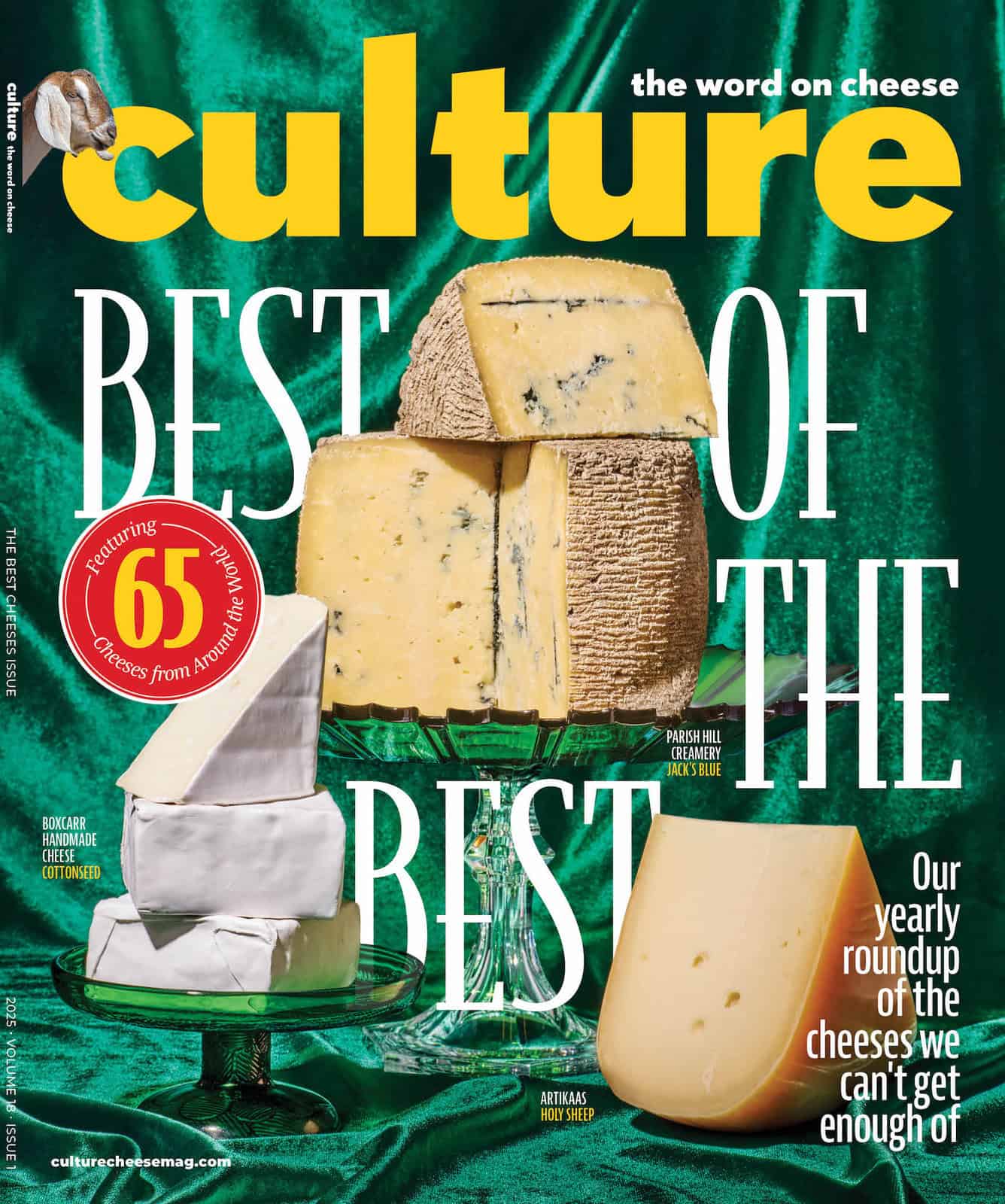Just outside of Manhattan, the Garden State offers cheeses worth celebrating—and eating, too!
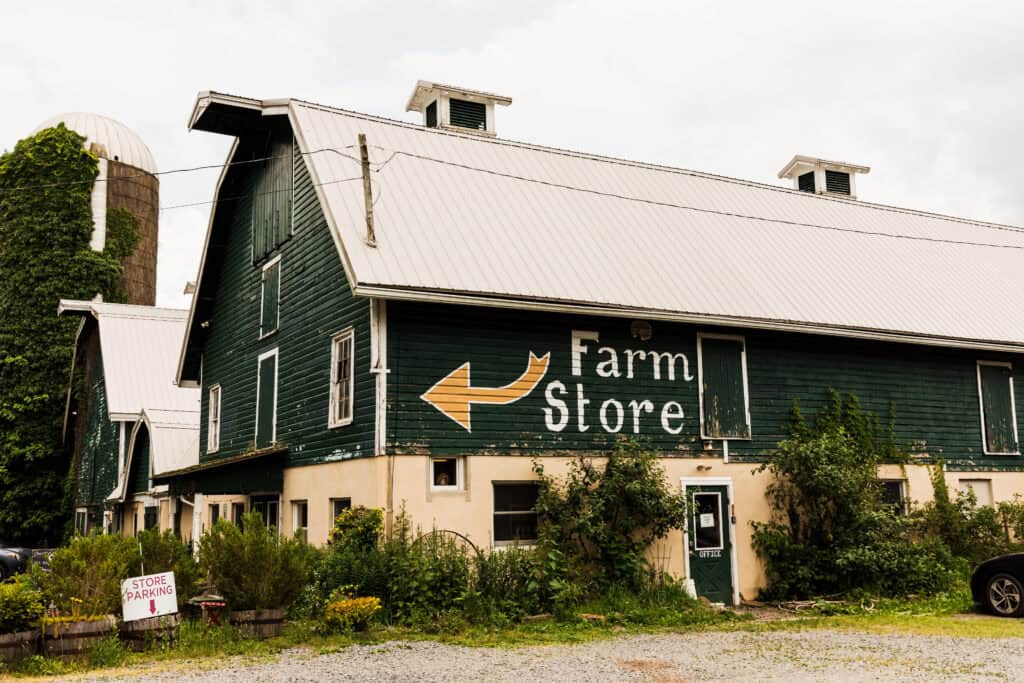
Throughout my nearly two decades in the cheese industry, I have never considered New Jersey a cheese destination—until now. As a cheese lover and writer, it’s taken years for me to discover the bounty and diversity of artisan cheesemakers in my new home state.
In 2020, my family and I moved to the Garden State, a place near and dear to me, having no idea it was a burgeoning cheese hub. I am thrilled to report that legacy makers—a few decades constitute “legacy” in the relatively young world of American artisan cheese—and brilliant newbies are crafting cheeses worth pursuing, wherever you call home.
Years ago, before we settled in New Jersey, I visited Bobolink Dairy and Bakehouse, a regenerative farmstead dairy. Now I live just a few miles away, and I always have a knob of their butter in my fridge. I’ve become enamored with Cherry Grove Farm’s spicy Abruzze Jawn, made with milk from their herd of grass-fed cows and studded with zesty peppers and spices. And when my toddler was invited to feed baby goats at Gorgeous Goat Creamery, I discovered a gorgeously crafted fresh chèvre that could rival its French counterpart.
Get to know these five New Jersey cheesemakers who are hard at work creating delicious cheese and enriching their communities.
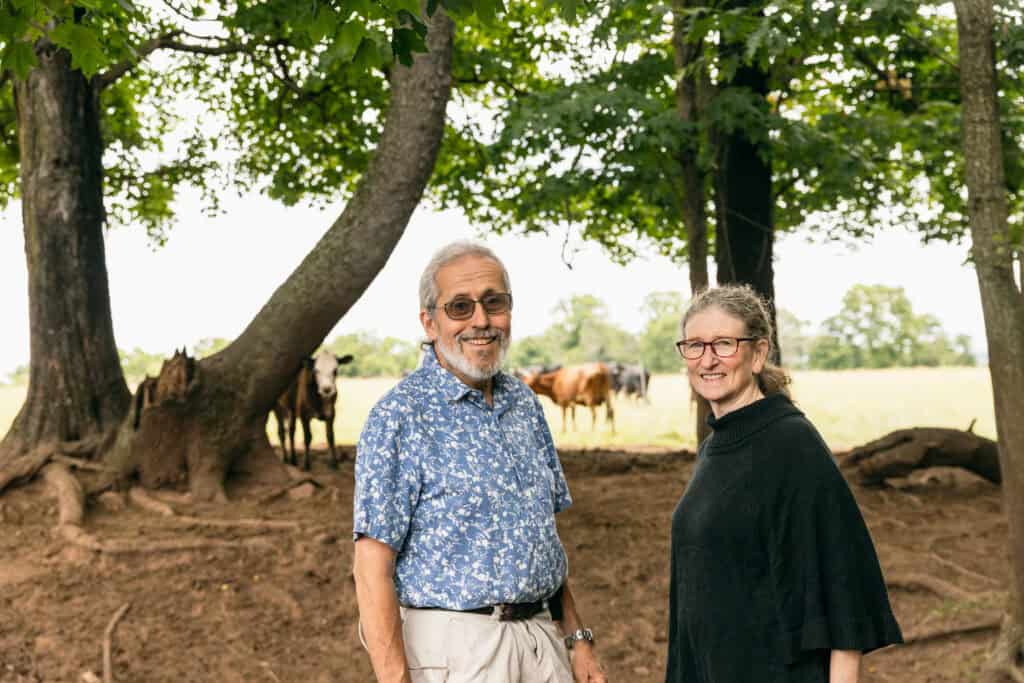
BOBOLINK DAIRY & BAKEHOUSE
When husband-and-wife team Jonathan and Nina White founded Bobolink Dairy and Bakehouse in 2002 in Milford, New Jersey, making grass-fed, farmstead cheeses on their small-scale regenerative farm began as an experiment.
At first novice cheesemakers, the Whites gave themselves a crash course on their own property, focusing on cheese as “part of a circle of interlinked products in a seasonal rhythm,” Nina says. “We were working with Mother Nature to heal the earth and help nurture its creatures.”
They’ve created something extraordinary and become a second home to many in their community. Last week, my family gathered on a green stretch of their pasture to listen to Na’Bodach, a swinging Celtic band. My kids danced their hearts out, climbed over the hills to peep the tractors and a few majestic cows, and feasted on cheese plates, burgers from Bobolink’s own pasture-raised cows, and homemade strawberry ice cream. We bought some chewy lemon thyme cookies at the farm store around the corner.
Bobolink’s cheeses are “live, native, vibrant, and complex,” explains Nina. Made with native cultures and milk from their herd of 65 cows, their line of cheeses leans into funk and the farmhouse flavors shine through (the number of cheeses offered changes with the seasons), from soft-ripened Amram to crumbly, bold Jean Louis. Standouts include Frolic, a subtly grassy, Alpine-style melter that pairs flexibly with a variety of accompaniments, and Cave-Aged cheddar, a savory, crystal-studded cheese that brings mac and cheese and chili to the next level. The latter is made in collaboration with Amish graziers in Lancaster, Pennsylvania, who age the cheddar wheels for up to two years before returning them to Bobolink.
369 Stamets Rd.
Milford, NJ 08848
cowsoutside.com
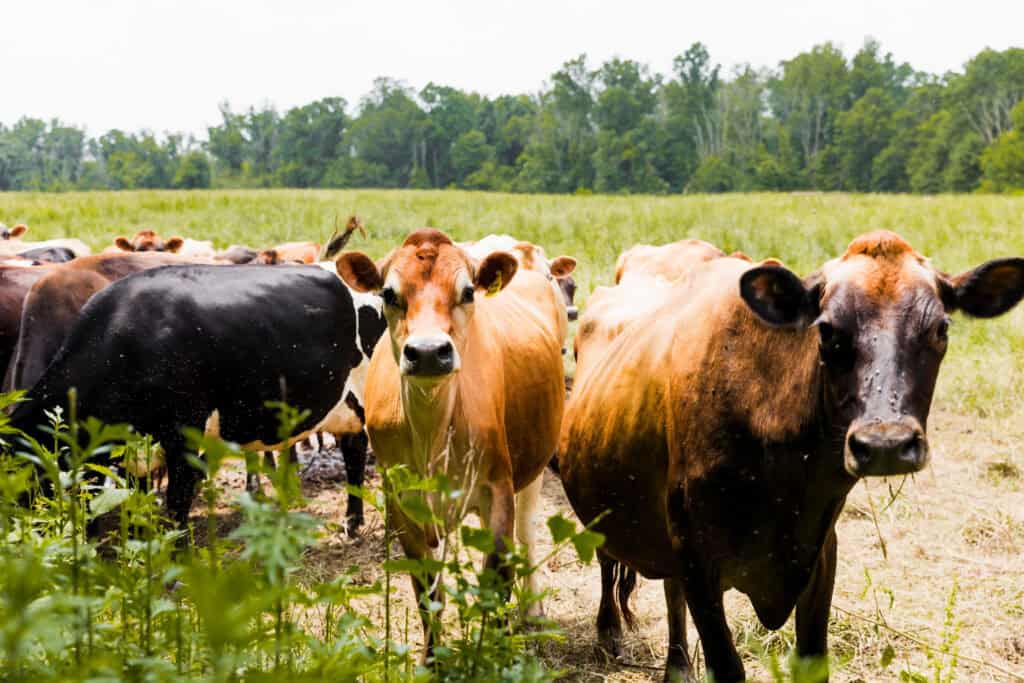
CHERRY GROVE FARM
As we walked through his cheese caves, Paul Lawler, Cherry Grove Farm’s head cheesemaker, pointed out wheels of Herdsman, Havilah, and Toma resting gracefully on racks in a temperature and humidity-controlled environment.
Cherry Grove’s cheese caves have grown slowly but surely, one grant at a time, and they’re constantly experimenting with new recipes. “Cheese is always surprising and always challenging,” Lawler says. “Each cheese has a real specificity of flavor from our little herd.” Cherry Grove uses the farmstead model, which means everything happens on their property, from milking cows to crafting and aging cheese.
I fell for their Toma, a semi-soft washed-rind wheel that tasted of tangy yogurt, lemon zest, and sea salt; as well as Trilby, which is washed with Dad’s Hat Rye Whiskey and wrapped in applejack-soaked fig leaves from the farm’s trees. Their Abruzze Jawn, made with a heady mix of peppers that includes red pepper, ancho, pepperoncini, guajillo, and pimenton,“tastes like pepperoni for vegetarians,” Lawler says.
Oliver Hamill, Cherry Grove Farm’s owner, began his farm in 2002 on land in Lawrenceville that has been in his family for more than a century. Originally leased to several dairy farmers, Hamill had a vision to consolidate the farm, prioritizing regenerative agricultural practices such as rotational grazing to make sure the land would thrive for generations to come. Hamill took me on a tractor ride across the 200 acres of certified organic, idyllic green pasture (there are also nearly 300 acres of undeveloped woodlands and wetlands) to meet his herd of mostly Jersey cows (with a smattering of Milking Shorthorn, Friesian, Ayrshire, and Dutch Belted breeds for added diversity) and whey-fed heritage pigs.
Their charm-filled shop stocksa sampling of the abundance from their farm, including their farmstead cheeses, grass-fed beef, whey-fed pork, a selection of salamis, and pastured eggs, plus other local goodies such as Eat This Yum! marmalade from Bucks County, Pennsylvania.
3200 Lawrenceville Rd.
Lawrence Township, NJ 08648
cherrygrovefarm.com
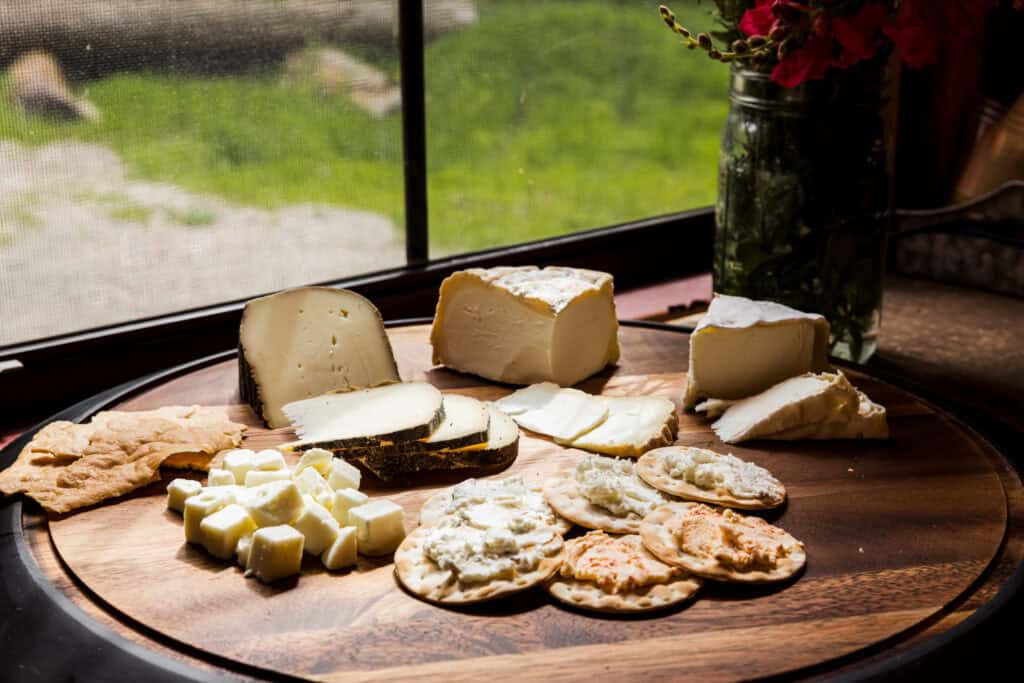
GORGEOUS GOAT CREAMERY
In 2020, Maria Stewart and her husband, Matt Kriegler, launched Gorgeous Goat Creamery in Stockton “as a happy accident,” Stewart explains, after purchasing four goats to help clear out weeds and invasive species on their 17-acre farm, which was largely hardwood forest. “How do you not fall in love with them?” she asks.
At first, Stewart experimented with making goat cheese in her kitchen, drawing from her background in food science to guide her. “Some cheese tasted like feet, but some was absolutely delicious,” she remembers. When Stewart was pleased with her results, she began questioning: What does it take to start a dairy operation? From farm design and procuring proper equipment to dealing with the departments of health and agriculture, the couple had a significant amount of work on their plate.
These days, Kriegler makes the cheese and Stewart manages their small herd of goats, which involves breeding, kidding, feeding, cleaning, and caring for their health. They use firewood from their own property to heat their home, provide shelter for their animals, and create their rustically beautiful market displays. Their staple fresh chèvre is a spreadable, citrusy topping for bagels and crackers. They also make a briny, bright, 100 percent goat’s milk feta, and a goat’s milk yogurt with probiotic cultures, which doubles as a flavor-packed, tangy base for salad dressings and tzatziki. Their pasteurized goat’s milk is the only farmstead-bottled goat’s milk available in New Jersey.
As the operation expands, Gorgeous Goat will move to a new property nearby with plenty of room for a state-of-the-art cheese processing facility where they’ll develop a new aged goat’s milk cheese. However, they don’t plan on getting too big. Stewart explains, “[We don’t] want to get to the size where our goats all have numbers—we want to know all the goats by name.”
71 Featherbed Ln.
Stockton, NJ 08559
gorgeousgoat.com
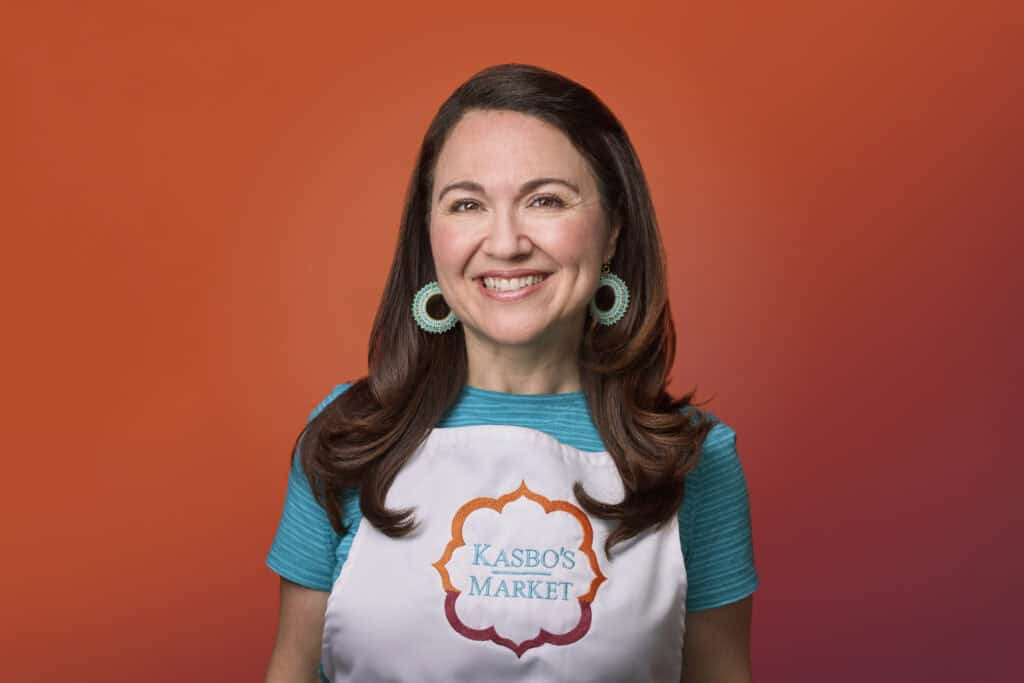
KASBO’S MARKET
As a toddler, Benita Kasbo moved from Aleppo, Syria, to Paterson, New Jersey, with her family, but it wasn’t until she became a mother that she started making jibneh, an Arabic cheese, in her home kitchen. During the pandemic, Kasbo decided to turn her cheesemaking hobby into a career. Today, she crafts her jibneh in a commercial kitchen in Madison, and distributes the cheese to local shops and Zabar’s in New York City. “I love broadening people’s palates and perspectives,” Kasbo says. “I love instilling a positive feeling about a part of the world that can be challenging.”
Kasbo starts her cheesemaking process with whole cow’s milk curd, which she cuts, cures with salt, and drains. The cured curds are then boiled in a water bath with mahleb, a spice made from the ground stones of the cherry species Prunus mahaleb; the process perfumes the whole kitchen with a floral nuttiness. This aromatic spice gives the mild, snackable cheese a distinctively sweet, roasted almond depth. Jibneh shines in watermelon salads, and Kasbo especially enjoys the cheese melted on pita bread with Aleppo pepper, dried mint, and olive oil.
For Kasbo, her biggest challenge is “being a single person who has to do everything,” from making the cheese to marketing her small business. But Kasbo is fueled by passion, and by the enthusiastic reception she’s received from buyers and eaters who send pictures of their kids relishing her jibneh, occasionally sprinkled with za’atar. “I have found such an amazing community in New Jersey,” Kasbo says. “I love that I can bring something international and make it locally.”
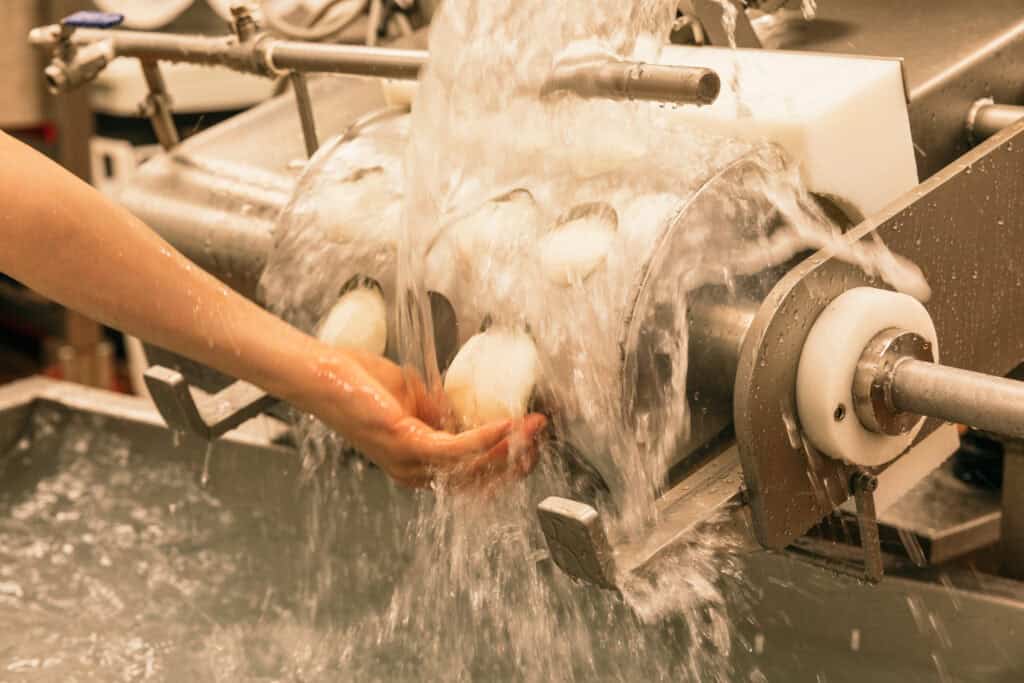
JERSEY ARTISAN CO.
Born and raised in Morris County, Salvatore Pisani was inspired by his dad, Rocco Pisani. “My father is from the mountains of Calabria, Italy; he came to the US in 1986,” Pisani says. “My mom is from Istanbul and moved here when she was five. My parents kept their food traditions alive as I was growing up.”
Pisani started out studying marine biology at Monmouth University, but he switched majors to marketing and management when he realized he wanted to work in food—he missed his family ethos of “sourcing local, seasonal products, making our own sauce and salami.” After working at a water buffalo farm in Sussex County, he knew he wanted to make cheese.
In the summer of 2023, Pisani opened Jersey Artisan Co. to share these food traditions, which meld southern Italian heritage with New Jersey terroir. A Calabrian cheesemaker with three decades of experience flew to New Jersey to mentor Pisani. Twice a week, Pisani travels to Spring Run Dairy, a family-owned farm in Pittstown, to collect fresh cow’s milk. “It’s an amazing family farm with Jersey breed cows,” Pisani explains. “It’s high-butterfat, delicious milk.”
Back at their brand-new wholesale facility in Whippany, this milk transforms into southern Italian classics: creamy mozzarella, burrata, scamorza, and ricotta. Jersey Artisan Co. also makes fresh pasta and naturally leavened bread, all for sale at their retail shop in East Hanover, and at farmers’ markets around the state.
“Every day is different—it’s a challenge and that’s fun,” Pisani says, who loves living, working, and making cheese in his home state. “Jersey is right in the name—it’s where we get our ingredients, and it’s a part of everything we do.”
16 Littell Rd., #4B
East Hanover, NJ 07936
jerseyartisan.com


